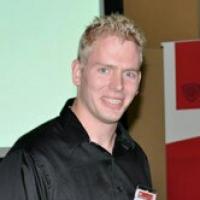SystemX Affiliates: login to view related content.

"Wireless Power Transfer and the Successful Biomedical Startup"
View presentation PDF (requires SUNet ID or Member login)
View presentation VIDEO (requires SUNet ID or Member login)
In the ongoing age of active implantable medical devices there is an ever-present need to safely provide electrical power an exploding number of medical implant technologies. In some cases, such as cardiac pacemakers or deep brain stimulators, single large batteries may be designed to last years before needing to be surgically replaced. However, in other cases such as commercially available cochlear implants and retinal prostheses, power is delivered continuously and transcutaneously via a pair of inductively-coupled coils. The present talk describes the inherent tradeoffs present in the real-world choices an implant designer makes in the construction of a power system, using the Oculeve (a startup spun out of Stanford in 2011) lacrimal stimulator as a case study of a successful implant design effort.
James Loudin is cofounder of two venture-backed medical startups: Oyster Point Pharma and and Oculeve, Inc. He served as Vice President of Research and Development at Oculeve until its acquisition by Allergan, Inc in August 2015. He earned his PhD in Applied Physics at Stanford University, where he received the National Science Foundation Graduate Research Fellowship in 2006, graduating in 2010. He received the 2011 Pascal Rol Award for best paper in Ophthalmic Technologies for his thesis work on retinal prostheses. In 2005 he graduated summa cum laude from Rice University in Houston, Texas, as the only member of his class to earn three simultaneous degrees, with a B.S. degree in physics, a B.S.E.E. degree in electrical engineering, and a B.A. degree in mathematics.


